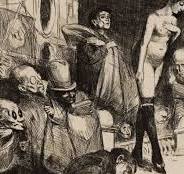The Age of Geniuses: Bruno Schulz and Lwów's Interwar Avant-Garde
- Yiddish Shmoozers in Translation

- Apr 11, 2024
- 3 min read
Updated: May 18, 2024
Sun. May 19, 2024, 3:00-4:30 pm, Los Angeles Time
UPDATE 5/18 7 pm. APOLOGIES! THE SITE CRASHED, TAKING PARTS OF THE TEXT AND FORMATTING. SOME PDFs AND THE DISCUSSION QUESTIONS REMAIN
UPDATED 5/17: SCROLL DOWN FOR DISCUSSION QUESTIONS

CONTENTS
I. THE BOOK
II. ROAD MAP
III. SPECIAL GUEST David Goldfarb
IV. BLOGSPOT V. DISCUSSION QUESTIONS
VI. OTHER SOURCES
VII. HOW TO JOIN A SHMOOZE
I. THE BOOK
The new translation of Bruno Schulz, Collected Stories, by Madeline G. Levine (Northwestern U Press) is highly recommended. The book won the Polish Cultural Institute's Found in Translation Award in 2019. There is also the important 1963 Penguin edition with translation by Celina Wieniewska.

The visual artist and author Bruno Schulz 1892-1942.
II. ROAD MAP
Page numbers are to the Levine translation except as indicated. Vogel poems are in Anastasiya Lyubas, Blooming Spaces: The Collected Poetry, Prose, Critical Writing, and Letters of Debora Vogel
A. Mannequins in Schulz and Vogel
B. The Encounter with Modernity in Stories by Schulz
C. The Fantastic and the Grotesque in Schulz's Oeuvre
D. Bruno Schulz in Yiddishland
From the book jacket: "In the 1930s. . . .Schulz used the Polish language to explore his own and his generation's relationship to East European Jewish exegetical tradition, and to deepen his reflection on golus or exile as a condition not only of the individual and of the Jewish community, but of language itself, and of matter. . . .This study explores Schulz's diasporic Jewish modernism as an example of the creative and also transient poetic forms that emerged on formerly Habsburg territory, at the historical juncture between empire and nation-state.
Then:
III. SPECIAL GUEST David A. Goldfarb

Schulz scholar David Goldfarb will join the conversation on 5/19. David is a scholar of Polish literature and literary theory specializing in key figures of Poland's interwar avant-garde. He is also a literary translator from Polish to English. David has been an advisor in planning readings and discussion points for the 5/19 session. Some PDFs of his work on Schulz appear below. David also hosts the monthly video series Encounters with Polish Literature https://instytutpolski.pl/newyork/2021/01/12/encounters-with-polish-literature/produced in collaboration with the Polish Cultural Institute New York). See the episodes on Bruno Schulz, Debora Vogel (with Anastasia Luybas and Karolina Syzmaniak), and Karen Underhill. Anthropologists may note that that David's dissertation "The Discourse of the 'Primitive' in Eastern and Western European Modernism" was supervised by the humanistic and psychologicak anthropologist Vincent Crapanzano.
IV. BLOGSPOT
Coming sooner . . . Or maybe later
Man Ray's Mannequin, from photos taken of mannequins by
various artists for the International Surrealism Exhibit, Paris, 1938.
V. DISCUSSION QUESTIONS
1. Why are mannequins interesting in this period and what do they represent in Schulz's writing? Are they lifeless imitations or emblems of creation? What is Schulz's father's relationship to mannequins?
2. Schulz's story Street of the Crocodiles critiques modernization (capitalist development) through an anti-realist, melancholic (modernist) lens. How does this strategy of confrontation and transfiguration strike you today?
3. How does Schulz's theme of reality interrupting the mythological world play out in The Sanitarium Under the Hourglass? How is language (the word) important to recovering the mythological?
4. What is the transformational and generative presence of birds in Schulz's stories--and in the poem Afn Veg Shteyt a Boym by Itzik Manger? What prevents Schulz's father and Manger from becoming birds? What IS flying in these works? How is it like and unlike the myth of Icarus?
VI. OTHER SOURCES

VII. HOW TO JOIN A SHMOOZE
The Yiddish Shmoozers (In Translation) started in 2018, when an anthropologist (Gelya Frank) and a rabbi (Haim Dov Beliak) didn't walk into a bar.
You, too, can drop in any time by showing up on Zoom. We welcome anyone to the conversation who makes comments related to the book's text and/or context. We're also happy to have you drop by if you want to listen.
Expect a small group of about 12-15 people per session. The tone is reliably friendly and respectful. Questions? Suggestions?
Contact us:
Gelya Frank
Anthropologist, Writer, Shmoozamama







Comments